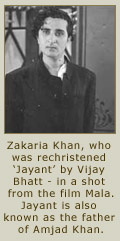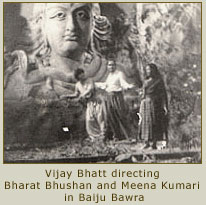- Home
- The Beginning
- Spotlight
- Tours
- Honours
- The End
Phase One
With the founding of Prakash Pictures, Vijay Bhatt had finally come into his own as a film maker. He would now realize the dream of a lifetime. A dream he was to convert into celluloid many times over. Among the vast repertoire of films made under this banner are some timeless classics such as Ram Rajya, Bharat Milap, Chaitanya Mahaprabhu, Baiju Bawra, Goonj Uthi Shehnai and many more.
 In 1933, Vijay Bhatt wrote and produced one of the earliest films in his mother tongue, Gujarati. The film was 'Sansaar Leela', a family social drama which was a big hit. This was followed by a two-reeler, 'Jayman nu Rasjivan' (1935) and 'Snehlata' (1936), which also had a Hindi version.
In 1933, Vijay Bhatt wrote and produced one of the earliest films in his mother tongue, Gujarati. The film was 'Sansaar Leela', a family social drama which was a big hit. This was followed by a two-reeler, 'Jayman nu Rasjivan' (1935) and 'Snehlata' (1936), which also had a Hindi version.
It is interesting to note that playing a small role in 'Sansaar Leela' was a newly recruited actor with a good voice and an imposing personality. He was Zakaria Khan, who was rechristened Jayant by Vijay Bhatt. He was a police officer with the erstwhile state of Alwar who gave up his job to pursue a career in films. The role in 'Sansaar Leela was merely a screen test. The actor had made such a favorable impression on the Bhatts that they cast him as a leading man in a series of Prakash films like 'Bombay Mail' (1935), 'Challenge' (1936), 'His Highness' (1937), 'State Express' and 'Bijli'. For his own part, Jayant, who started out on a mere Rs. 30 as monthly wages and soon rose to a salary of Rs. 700 a month, distinguished himself both as a leading man and later as a character actor. Vijay Bhatt always maintained good relations with him and was extremely proud of Jayant's son, Amjad Khan's achievements. When Amjad Khan was hospitalized following an accident, the film maker went to call on the son of his former artist. Moved by the gesture, Amjad Khan told his family members ' Remember him - he is the man responsible for bringing all of us into films.'
He was Zakaria Khan, who was rechristened Jayant by Vijay Bhatt. He was a police officer with the erstwhile state of Alwar who gave up his job to pursue a career in films. The role in 'Sansaar Leela was merely a screen test. The actor had made such a favorable impression on the Bhatts that they cast him as a leading man in a series of Prakash films like 'Bombay Mail' (1935), 'Challenge' (1936), 'His Highness' (1937), 'State Express' and 'Bijli'. For his own part, Jayant, who started out on a mere Rs. 30 as monthly wages and soon rose to a salary of Rs. 700 a month, distinguished himself both as a leading man and later as a character actor. Vijay Bhatt always maintained good relations with him and was extremely proud of Jayant's son, Amjad Khan's achievements. When Amjad Khan was hospitalized following an accident, the film maker went to call on the son of his former artist. Moved by the gesture, Amjad Khan told his family members ' Remember him - he is the man responsible for bringing all of us into films.'
 In the meanwhile, Vijay Bhatt decided to take on the baton of a director. Until now, he wrote and produced the films which were directed by others. But now, he had a firm grasp over the medium and a definite perspective on the kind of films that should be made under his banner. Shankarbhai concerned himself with production, studio affairs, business and financial matters. While Vijay Bhatt made a foray into the creative side of film making.
In the meanwhile, Vijay Bhatt decided to take on the baton of a director. Until now, he wrote and produced the films which were directed by others. But now, he had a firm grasp over the medium and a definite perspective on the kind of films that should be made under his banner. Shankarbhai concerned himself with production, studio affairs, business and financial matters. While Vijay Bhatt made a foray into the creative side of film making.
His first directorial venture was 'Dreamland' (Khwaab ki Duniya), made in 1936. It was inspired by Hollywood's 'Invisible Man'. An enthusiastic and enterprising young artist form the painting department in the studio was a great help during the filming of this movie. The black thread he used for the trick scenes earned him the epithet 'Kaala Dhaaga'. He was none other than Babubhai Mistry, a man who eventually became the most sought after trick-scene photographer, a technician par excellence and as Vijay Bhatt said, 'a star in his own right.'
 The directorial ventures that followed were 'State Express' (1938) and 'Leather Face', starring Jairaj, Mehtab and a seven year old child artist with a somewhat cumbersome name, Mehezbin Naaz. Vijay Bhatt, or Vijubhai as he was fondly known, wanted her to have a simple name and so he named her Baby Meena. This child artist eventually became the celebrated Meena Kumari, who after attaining maturity and working in scores of action and mythological movies, came back to Prakash in 1952 to give a memorable performance in 'Baiju Bawra'. It was Vijay Bhatt, who with this classic helped her to establish herself as an actress to reckon with. It was this film for which she received her first Filmfare Award. In fact, it was the first time that a category for Best Actress was introduced by the Filmfare Awards Committee. Vijay Bhatt was responsible for making another young actor named Bharat Bhushan, into a top league leading man through this film.
The directorial ventures that followed were 'State Express' (1938) and 'Leather Face', starring Jairaj, Mehtab and a seven year old child artist with a somewhat cumbersome name, Mehezbin Naaz. Vijay Bhatt, or Vijubhai as he was fondly known, wanted her to have a simple name and so he named her Baby Meena. This child artist eventually became the celebrated Meena Kumari, who after attaining maturity and working in scores of action and mythological movies, came back to Prakash in 1952 to give a memorable performance in 'Baiju Bawra'. It was Vijay Bhatt, who with this classic helped her to establish herself as an actress to reckon with. It was this film for which she received her first Filmfare Award. In fact, it was the first time that a category for Best Actress was introduced by the Filmfare Awards Committee. Vijay Bhatt was responsible for making another young actor named Bharat Bhushan, into a top league leading man through this film.
 'Baiju Bawra' also helped take the career of another artist to dizzying heights. It was that of Naushad the music director. But Baiju Bawra was not the first time Vijay Bhatt worked with Naushad. In fact, it was Bhatt who was responsible for giving Naushad his first major break way back in 1940. At that time, lyricist D. N. Madhok, who had also written the story and dialogues for 'Mala', recommended a young struggling music director, who had only scored the music for only one film till then, 'Prem Nagar'. The Bhatt brothers heard some of his tunes and signed him on a monthly salary of Rs.250. Naushad scored music for two more Prakash films, 'Darshan' (1941) and 'Station Master' (1942). It was 'Station Master' that helped Naushad showcase his amazing talent for composing and
'Baiju Bawra' also helped take the career of another artist to dizzying heights. It was that of Naushad the music director. But Baiju Bawra was not the first time Vijay Bhatt worked with Naushad. In fact, it was Bhatt who was responsible for giving Naushad his first major break way back in 1940. At that time, lyricist D. N. Madhok, who had also written the story and dialogues for 'Mala', recommended a young struggling music director, who had only scored the music for only one film till then, 'Prem Nagar'. The Bhatt brothers heard some of his tunes and signed him on a monthly salary of Rs.250. Naushad scored music for two more Prakash films, 'Darshan' (1941) and 'Station Master' (1942). It was 'Station Master' that helped Naushad showcase his amazing talent for composing and  eventually put his career on a fast track to fame.
eventually put his career on a fast track to fame.
In 1952, Vijay Bhatt recalled him to Prakash to compose the score for 'Baiju Bawra' - a script that would be every music director's dream. Vijay Bhatt inspired Naushad to come up with one of his career's most memorable scores.
A notable film belonging to this period, which exemplifies Bhatt's concern for burning social issues was 'Poornima'. At that time, along with most other studios, Prakash too was making action films, fantasies and legend based movies. But 'Poornima' was an attempt at experimentation with socially relevant themes. It was a story about a prostitute's daughter seeking marriage and respectability and it was adapted from a novel of the same name by one of Gujarati literature's most notable writers, Ramanlal Vasantlal Desai.
Phase One | Phase Two | Phase Three